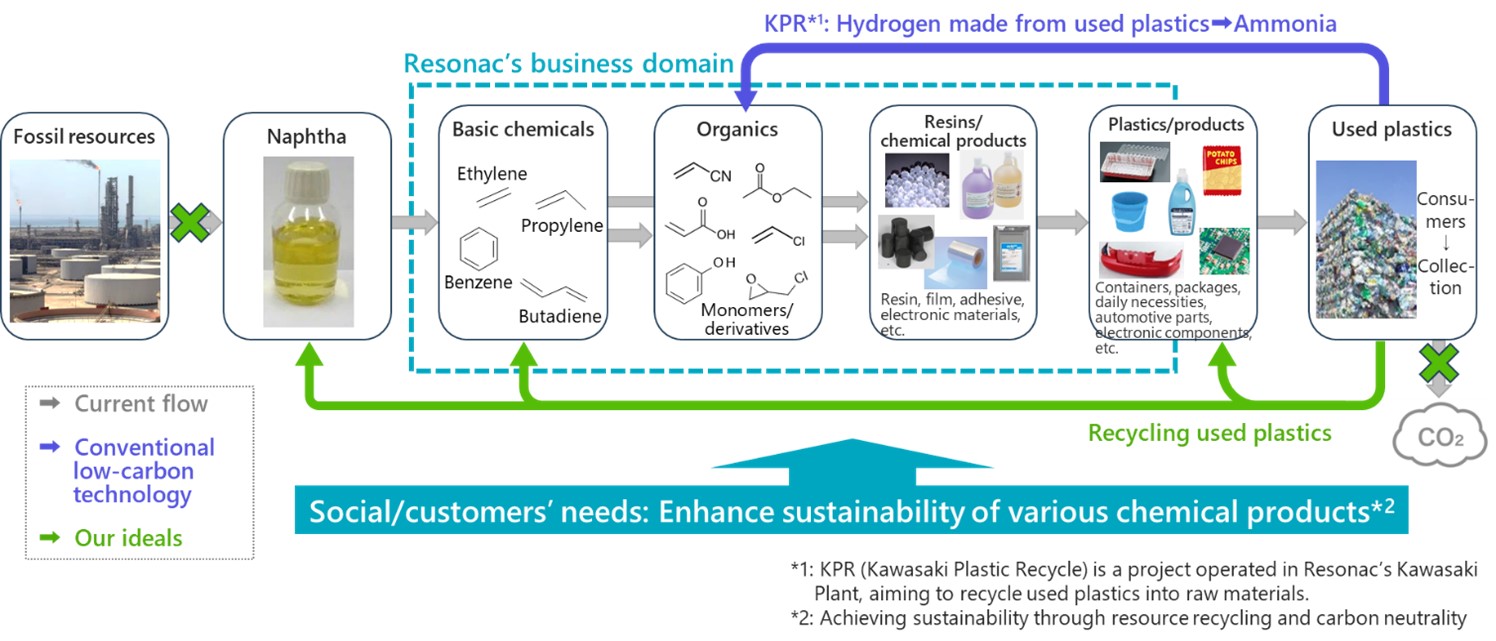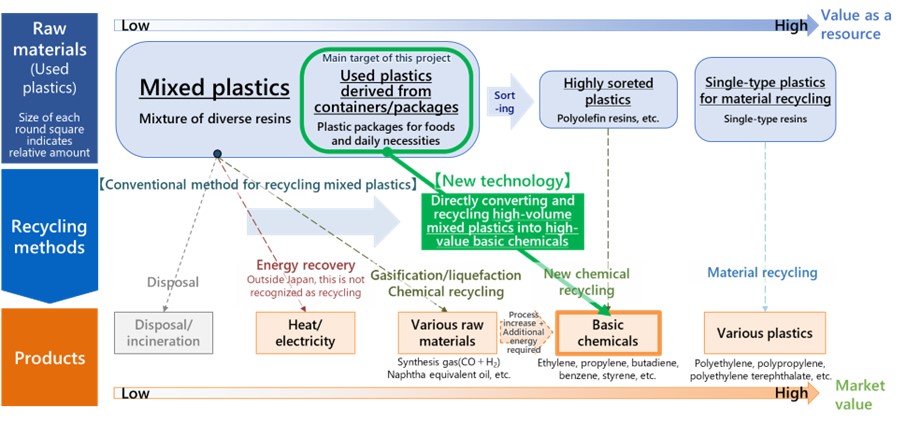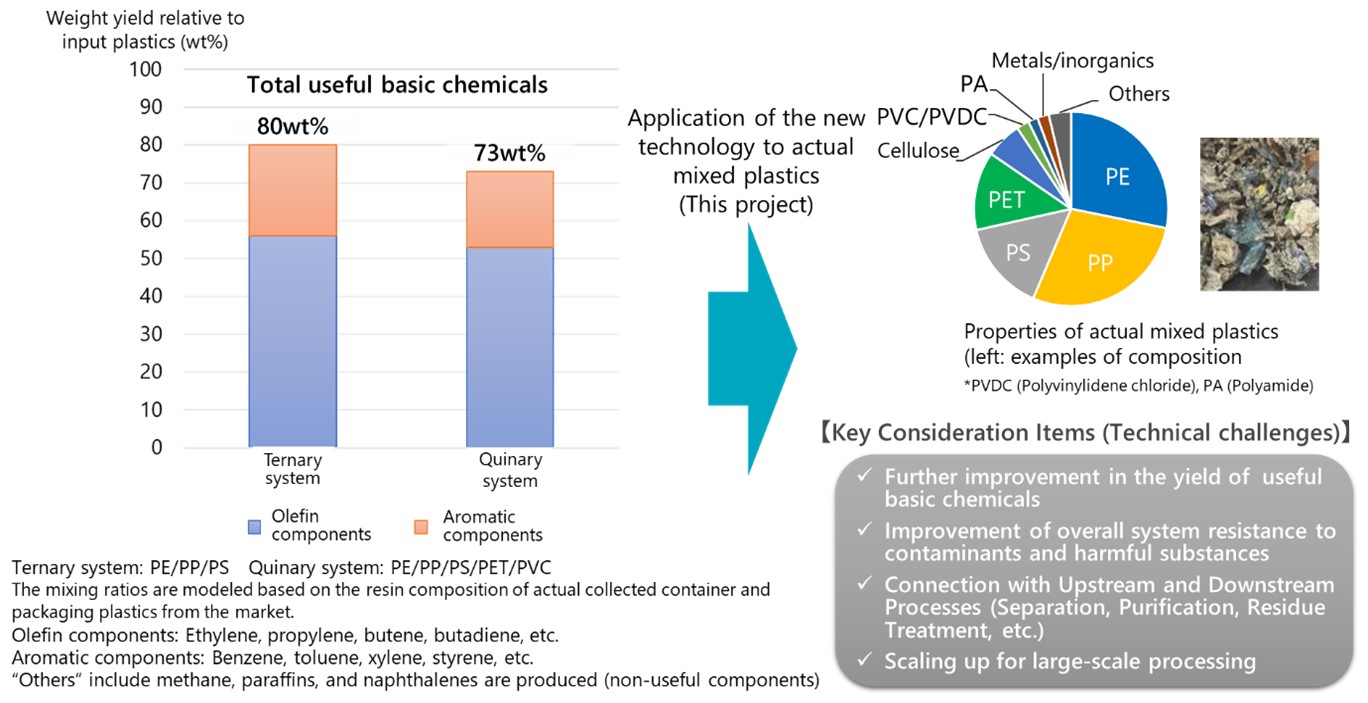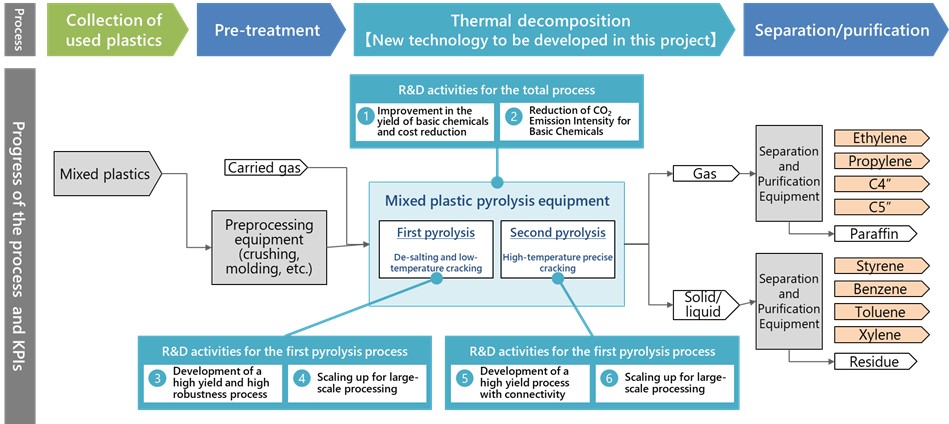March 27, 2025

Resonac Corporation (President: Hidehito Takahashi, hereinafter referred to as Resonac) and Microwave Chemical Co., Ltd. (President: Iwao Yoshino, hereinafter referred to as MWCC) have jointly launched a project (hereinafter referred to as “this Project”), which has been selected for the “Green Innovation Fund Project” by the New Energy and Industrial Technology Development Organization (NEDO) under the category of “Development of Plastic Raw Material Manufacturing Technology Using CO2, etc.,” specifically for “The Development of Chemical Recycling Technology to Produce Basic Chemicals from Mixed Plastic Wastes.*1” In March 2025, the two companies officially commenced joint development as a project supported by the GI Fund, aiming to establish plastic raw material manufacturing technology that does not rely on fossil resources. This initiative further develops and strengthens the two companies’ collaborative efforts that began in 2022.
As global efforts to realize a resource-recycling society and achieve carbon neutrality intensify, there is an increasing demand for chemical recycling*2 that can reprocess plastics and converts them into basic chemical products which are to be used as raw materials to reproduce plastics. Plastics traditionally rely on fossil resources and emit significant amounts of CO2 during manufacturing and incineration at the end of their life cycle. While there are pyrolytic oil-conversion technologies that transform highly sorted or single-type used plastics into mixed oils (such as naphtha-equivalent oils) and chemical recycling technologies that convert them directly into basic chemical products like ethylene and propylene, the volumes of such sorted or single-type used plastics are limited. Additionally, sorting and separating plastics incurs costs, and many types of plastics are difficult to separate. Therefore, establishing a chemical recycling technology that can thermally decompose used plastics, which are discharged in a mixed state, directly into basic chemical products without extensive sorting is expected to contribute significantly to further reductions in greenhouse gas (GHG) emissions.

Value chain and life cycle of various chemical products

Segments of the plastic recycling field and targets of this Project
Since 2022, Resonac and MWCC have been collaboratively working on the development of a technology that decomposes used plastics by irradiating them with microwaves to produce basic chemical products.*3 Microwave heating, which is also used in microwave ovens, transmits energy specifically to the target material. This technology focuses microwave energy on used plastics, enabling efficient decomposition into basic chemical products.
In this project, we will develop novel pyrolysis technology that directly converts and recycles actual mixed plastics into basic chemical products, aiming to produce useful basic chemicals*4 with a yield of over 60 wt% (weight percent) and to reduce CO2 emissions during production to below 0.8 kg-CO2/kg-olefin. We aim to establish recycling technology that can handle a variety of used plastics by conducting the pyrolysis of plastics using new methods such as microwave heating at a demonstration scale of several thousand tons per year.
Both companies have previously conducted experiments using model systems with virgin plastics, focusing on optimizing decomposition reaction conditions and processes. In a ternary system of polyethylene (PE), polypropylene (PP), and polystyrene (PS), they achieved a yield of 80 wt% of useful basic chemicals. In a more realistic quinary system that includes polyethylene terephthalate (PET) and polyvinyl chloride (PVC), the yield reached 70 wt%. In this project, we will first select the decomposition process and reactor types at the lab (experimental) and bench (small-scale prototype) levels, and then proceed with scale-up to pilot (medium-scale prototype) and large-scale demonstration levels while optimizing the operation conditions. Additionally, we will concurrently identify and address potential challenges that may arise during future commercialization.

Investigations into plastic decomposition method to date, and initiatives in this Project
In this project, Resonac will carry out the research and development activities listed as ① to ⑥ in the figure below, while MWCC will conduct investigations at the lab scale to bench scale using microwave heating for each of the developments ① to ⑥, as well as the basic design of pilot equipment.

Overview of research and development activities of this Project (① to ⑥)
We recognize that efforts in plastic recycling are an important social issue that the chemical and materials industries must address. Through this project, Resonac and MWCC aim to establish technologies to produce plastic raw materials that do not rely on fossil resources, contributing to a significant reduction in CO2 emissions by implementing these technologies in society.
*1 January 27, 2025 “Resonac’s Technology for Directly Recycling Mixed Plastic Wastes into Basic Chemicals Selected for NEDO’s Green Innovation Fund”
*2 Chemical recycling refers to the process of recycling used resources not in their original form, but after transforming their composition through chemical reactions. It involves recycling processes for used plastics such as conversion into oil, gasification, and conversion into chemical raw materials for coke oven.
*3 June 28, 2022 “SDK and Microwave Chemical Start Joint Development of New Microwave-based Chemical Recycling Technology to Directly Transform Used Plastic into Basic Chemical Feedstock”
*4 The useful basic chemicals referred here include industrially valuable basic chemicals such as ethylene, propylene, butadiene, benzene, toluene, styrene, etc.